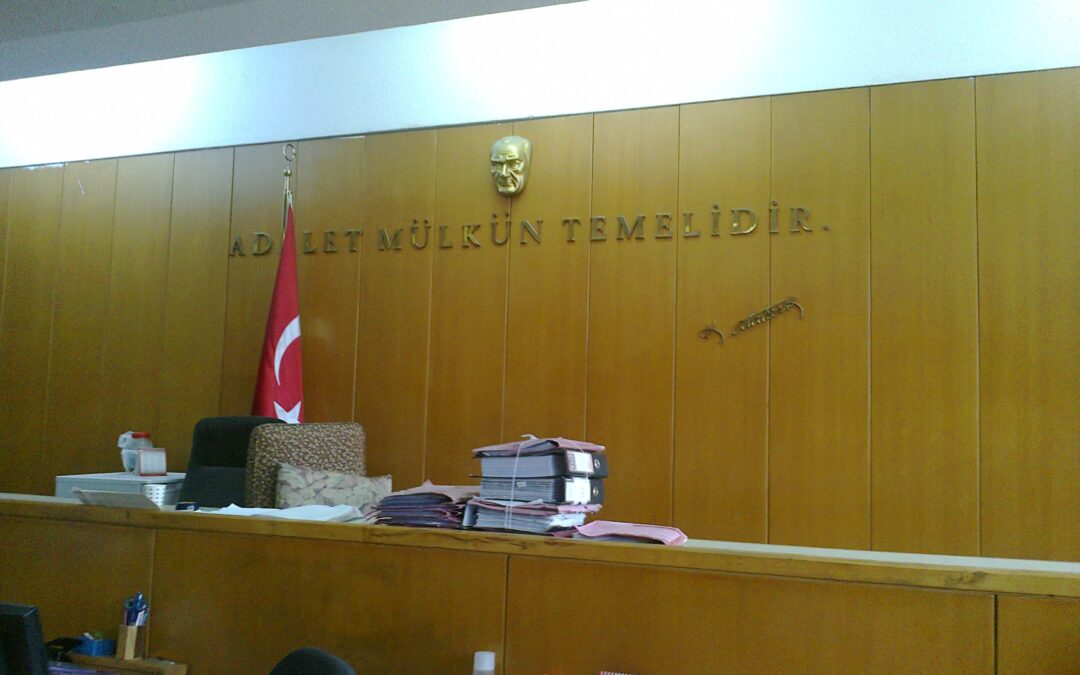
Feb 4, 2019 | News
The ICJ is concerned that the dismissal of 17 judges and prosecutors by Turkey’s Council of Judges and Prosecutors on 10 January, for alleged membership of or connections with the “Fetullahist Terrorist Organisation” (FETÖ) did not respect their right to a fair trial.
The decision by the Council of Judges and Prosecutors (CJP) is particularly problematic because it lacks any reasoning on the individual situation of each judge and prosecutor.
The ICJ points out that international law provides that judges may be dismissed only through a fair hearing before an independent authority. The lack of individual reasoning in dismissal decisions strikes at the heart of the right to a fair hearing.
Furthermore, the ICJ recalls its conclusions in the 2018 report Justice Suspended that, within the current constitutional framework, the Council of Judges and Prosecutors (CJP) is not provided with the guarantees necessary to ensure its institutional independence.
Despite the state of emergency having been lifted since last July 2018, extraordinary powers given to the Council of Judges and Prosecutors to dismiss judges and prosecutors during the State of Emergency were extended for 3 years by Law no. 7145. It is unacceptable in a State governed by the rule of law that judges and prosecutors – whatever charges may be against them – be dismissed without respect for the right to a fair procedure, in disregard of international standards.
Considering that the Council of State has not delivered a single decision about dismissed judges and prosecutors during the state of emergency, in more than two years now, it seems likely that it would take at least two years before the recent decision of the CJP is reviewed by an independent judicial authority. Until then, absent further action by the CJP, the reasons for the dismissals will not be known by the purged judges and prosecutors, or by the general public.
The ICJ calls on the CJP to revoke its order and re-examine the cases under the ordinary dismissal procedures and on the Turkish Government and Parliament to modify the constitutional rules on the CJP to ensure its full independence.
Finally, the ICJ expresses concern at the conviction of the former head of the judges’ organisation YARSAV, Mr Murat Arslan, for alleged membership of FETÖ. There are credible reports of violations of the right to a fair trial in the proceedings, including four changes of judges during the proceedings, often without reasons given and without re-examination of witnesses, significant limitations to the defence access to evidence before trial and use of witnesses with undisclosed identity. The ICJ considers that these allegations of violations of the right to a fair trial should be thoroughly re-examined in appeal before an independent court and in full respect of Mr Arslan’s fair trial rights.
Background
On 10 January, the Council of Judges and Prosecutors made use for the first time of special powers to dismiss judges and prosecutors without complying with the ordinary procedure, invoking extraordinary powers enacted by Law No 7145 of 31.07.2018. This legislation inserted into ordinary law several powers that had previously existed under the state of emergency legislation.
One of the amendments made by Law No 7145 of 31.07.2018 was to the Decree Law No 375 dated 1989. A Temporary Article (Article 35) was added to the Decree. On the basis of this article, the General Assembly of the Constitutional Court, the Presidency Councils of Court of Appeal, the Council of State, the General Assembly of the Council of Judges and Prosecutors, a Commission set up by the Ministry of National Security, and the Presidency of the Court of Audit, were each authorised to take dismissal decisions for public officials/judges and prosecutors under their mandate for three years from the date of the endorsement of the law No 7145.
Based on this amendment, on 10 January 2019 the Council of Judges and Prosecutors took its first decision (Decision No. 2019/1) by dismissing 17 judges and prosecutors (6 Public prosecutors, 3 Members of Administrative Court, 7 judges of of Tax Court) based on the allegation of membership to FETÖ.
International law and standards provide that disciplinary proceedings should be conducted by an independent authority or a court with all the guarantees of a fair trial and provide the judge with the right to challenge the decision and sanction. Disciplinary sanctions should be proportionate.
The UN Basic Principles on the independence of the judiciary set out international standards for discipline, suspension and removal of judges, including in order to ensure impartiality and independence of courts and tribunals as required by international law (including the International Covenant on Civil and Political Rights and the European Convention on Human Rights). The Basic Principles state that a:
“charge or complaint made against a judge in his/her judicial and professional capacity shall be processed expeditiously and fairly under an appropriate procedure. The judge shall have the right to a fair hearing. The examination of the matter at its initial stage shall be kept confidential, unless otherwise requested by the judge. …
The Consultative Council of European Judges (CCJE) adds that “a Head of State, Minister of Justice or any other representative of political authorities cannot take part in the disciplinary body.”
Contact
Massimo Frigo, ICJ Senior Legal Adviser for the Europe and Central Asia Programme, t: +41 22 979 3805, e: massimo.frigo(a)icj.org
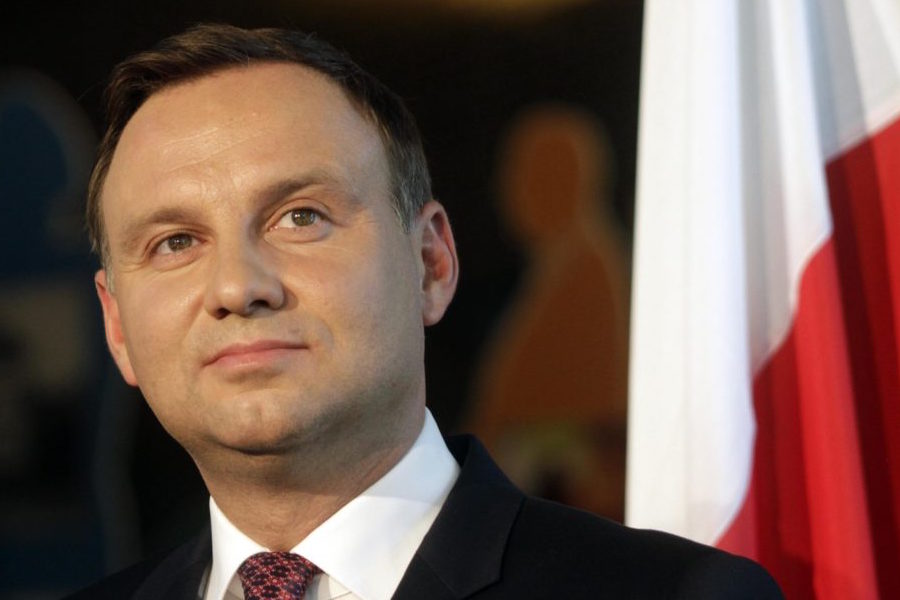
Dec 12, 2018 | News
The ICJ today called on President Andrzej Duda to sign legislation that would require the reinstatement of the Supreme Court justices that were forcibly “retired” in July 2018.
On 21 November 2018, the lower house of the Polish Parliament (Sejm) approved Draft Law no. 3013, which would amend the Law on the Supreme Court. This amendment would ensure that the Supreme Court and Supreme Administrative Court justices who “retired … return in office on the day of entry into force of this Law” (Article 2.1).
The Minister of Justice has stated that the Law is being adopted to implement the EU Court of Justice interim measures issued in the infringement proceedings against Poland for the failure to respect the tenure of its Supreme Court justices.
“The draft law is a step in the right direction to implement the interim measures by the Court of Justice of the EU,” said Massimo Frigo, Senior Legal Adviser for the ICJ Europe and Central Asia Programme.
“It is important that President Duda signs this law promptly to ensure the independence of the judiciary in Poland as well as respect for its obligations under EU law,” he added.
The ICJ however is concerned that this law still refers to the Supreme Court justices to be reinstated as “retired.”
The forced “retirement” of one-third of the Supreme Court Justices constituted effectively a disguised dismissal in breach of international law and EU law standards on the rule of law and the independence of the judiciary.
Any reference to the “retirement” of the Supreme Court Justices should therefore be deleted.
“The Government’s intention that these measures be issued to implement the Court of Justice’s interim measures suggests that these measures are not intended to be permanent,” said Massimo Frigo.
“The Court of Justice and the European institutions should pursue the Article 7 procedure and the infringement proceedings until the forced judicial “retirements” are fully rescinded and no further similar attempts are made to undermine judicial independence and function.”
Background
A law on the Supreme Court, which entered into effect in July 2018, attempted to force the “retirement” of 27 of the 72 Supreme Court judges, including the First President, by lowering the mandatory retirement age for its judges from 70 to 65 years.
The ICJ has condemned the “forced retirement” of the 27 Supreme Court Justices as violating the security of tenure of judges in direct contravention of the principle of judicial independence, as expressed in international law and standards.
These include the UN Basic Principles on the Independence of the Judiciary, Council of Europe standards, the European Court of Human Rights’ jurisprudence and the rule of law principles enshrined in article 2 of the Treaty on European Union.
An ICJ letter of 11 July 2018, signed by 22 senior judges from all regions of the world, urged the Polish government to act immediately to reinstate the forcibly retired judges in office.
The European Commission has recognized the current situation as undermining “the principle of judicial independence, including the irremovability of judges” and has triggered a procedure under Article 7 of the Treaty of the European Union that could ultimately lead to suspension of Poland’s EU voting rights.
The Commission has also launched infringement proceedings against Poland in respect of the law on the Supreme Court.
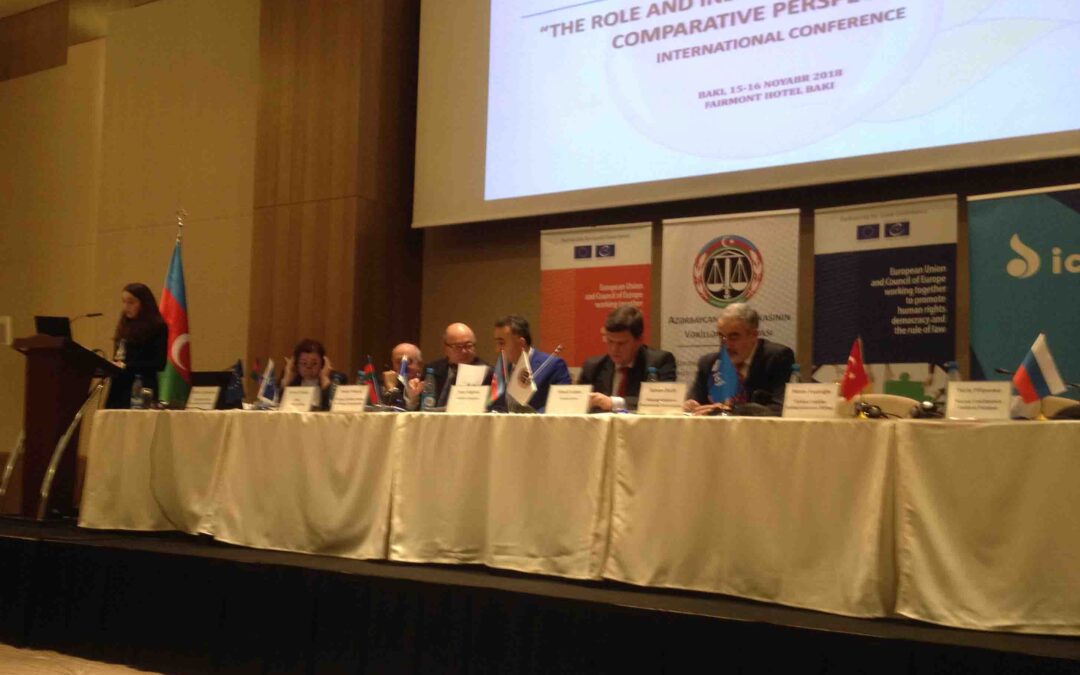
Nov 30, 2018 | News
The International Commission of Jurists (ICJ) together with the Council of Europe and the Azerbaijan Bar Association held the international conference on the independence of the legal profession in Azerbaijan on 15-16 November 2018.
The conference on the Role and Independence of Lawyers brought together comparative perspectives from countries of the Council of Europe region and Central Asia as well as from international organizations. Representatives of bar associations and individual lawyers from Azerbaijan, Georgia, Kazakhstan, the Netherlands, the Russian Federation, Switzerland, Turkey, Ukraine, the United Kingdom and Uzbekistan shared their experiences and best practices in addressing challenges to the independence of lawyers.
The ICJ considers the conference to be a landmark event which has created much-needed space for further dialogue on the issue of independence of lawyers in Azerbaijan both with the national and international stakeholders.
The ICJ appreciates the engagement of the Azerbaijan Bar Association and the open debate on these issues at the conference, as a step towards implementation of its previous recommendations that the Bar Association “should initiate, through a consultative process, an internal reform based on the principles of independence of the profession, high standards of legal practice, the protection of lawyers from threats, harassment and hindrance in their work, and the democratic participation of its members.” Defenseless Defenders: Systemic Problems in the Legal Profession of Azerbaijan
The ICJ stresses the need for the Azerbaijan authorities to respect both the institutional independence of the legal profession, and the individual independence of lawyers, in accordance with the international standards outlined at the conference and in the above-mentioned report. Decisions of competent international human rights authorities, including the European Court of the Human Rights, in cases concerning the rights of lawyers, must be implemented in full.
The ICJ looks forward to future dialogue and co-operation with the Azerbaijan Bar Association and other concerned stakeholders in Azerbaijan on the essential elements of an independent legal profession, including as regards lawyers’ professional ethics, qualification of lawyers and the disciplinary system. The new impetus for international engagement on these issues creates room for discussing the most acute institutional challenges and individual cases where the independence of the legal profession may be at stake.
Speaking at the Conference, Róisín Pillay, Director of the ICJ Europe and Central Asia Programme said that “the requirement of independence places responsibilities not only on the bar association itself but also on the executive and legislative powers to respect this independence, refrain from interference, and put in place – and respect in practice – appropriate legislative and institutional safeguards.”
Participants underscored problems relating to the ethical responsibilities of lawyers and their enforcement in disciplinary proceedings, in particular as regards potential friction with the exercise of freedom of expression of lawyers.
Temur Shakirov, ICJ Senior Legal Adviser, focused on the independence of lawyers as an ethical requirement of individual lawyers, saying that “Independence is an essential principle both for the bar association as an institution and for an individual lawyer. It is known that the institutional independence of the legal profession should be ensured, in accordance with international standards, both in law and in practice. However, the independence of lawyers is also an ethical requirement for each lawyer.”
Henry Reznik, Vice-President of the Federal Chamber of Lawyers of the Russian Federation, stressed in his presentation that “the primary role of the association of lawyers is to protect their [lawyers’] independence and freedom.” He added that “Advokatura is an institute of the civil society. Advokatura is not part of the State and municipal bodies. And Advokatura must have the trust of the society.”
Yuri Pilipenko, President of the Federal Chamber of Lawyers of the Russian Federation, highlighted the natural tensions between the legal profession and government, noting that “… the government and an independent self-regulating professional organization, which has goals to protect rights and freedoms and access to justice, are by definition opponents in a certain sense.”
In his concluding remarks at the Conference, Anar Baghirov, President of the Azerbaijan Bar Association, highlighted that the most crucial mission of the Bar Association was “to protect interests of lawyers and the institutionalized legal profession.”
In that regard he mentioned the need for modification of the Law on Advocates and Advocates’ Activity, stating that the most important role of the Bar Association should be reflected in the law. In addition, among other things he mentioned that issues to be addressed included the number of lawyers, increasing availability of pro bono legal aid, enhancing lawyers’ professional capacity, and cooperation with other countries’ bar associations and international organizations.
In his closing remarks at the Conference, ICJ Secretary General Sam Zarifi stressed the importance of lawyers in the protection of human rights and the rule of law. He stressed that around the world, lawyers were attacked because of their role in defence of their clients: for what they say, what the individuals they represent say, and that such attacks violate the clear prohibition of identifying lawyers with their clients.
He stressed the key role of the bar association in this regard: “To maintain the role of lawyers we have heard again and again how important it is that lawyers have the independence and an association that can pretend this independence. It is part of international law and standards and we would like that standard to be implemented around the world and of course here [in Azerbaijan]. We need bar associations, which are independent and strong to defend the independence of lawyers.”
The ICJ will continue to closely follow issues of the independence and role of lawyers in Azerbaijan. It will continue its international engagement on such matters including with UN and Council of Europe institutions, as well as with lawyers and civil society in Azerbaijan in order to facilitate the independence of lawyers, their protection from harassment and reprisals, and other key principles in line with the UN Basic Principles on the Role of Lawyers.
Background information
Problems regarding independence of the legal profession in Azerbaijan were outlined in the ICJ report “Defenseless Defenders: Systemic Problems in the Legal Profession of Azerbaijan” https://www.icj.org/azerbaijan-the-independence-and-role-of-lawyers-must-be-respected-icj-report-says/
The ICJ has raised concerns regarding cases of abusive disciplinary proceedings and other threats to the independence of lawyers, including:
Cases of Democracy and Human Rights Resource Centre v. Azerbaijan and Mustafayev and Democracy and Human Rights Resource Centre v. Azerbaijan: https://www.icj.org/azerbaijan-icj-intervenes-before-european-court-of-human-rights-in-defence-of-harassed-lawyers-and-civil-society/
Azerbaijan: Lawyer Irada Javadova disbarment decided in unfair proceedings, https://www.icj.org/azerbaijan-lawyer-irada-javadova-disbarment-decided-in-unfair-proceedings/
Alayif Hasan oglu Hasanov v. Azerbaijan case: https://www.icj.org/azerbaijan-icj-intervenes-before-the-european-court-of-human-rights-in-a-case-concerning-restrictions-of-lawyers-rights/
Cases of Annagi Hajibeyli, Khalid Bagirovand Intigam Aliyev v Azerbaijan, https://www.icj.org/wp-content/uploads/2016/11/ICJ-Bagirovothers-AmicusBrief-Azerbaijan-2016-Final.pdf
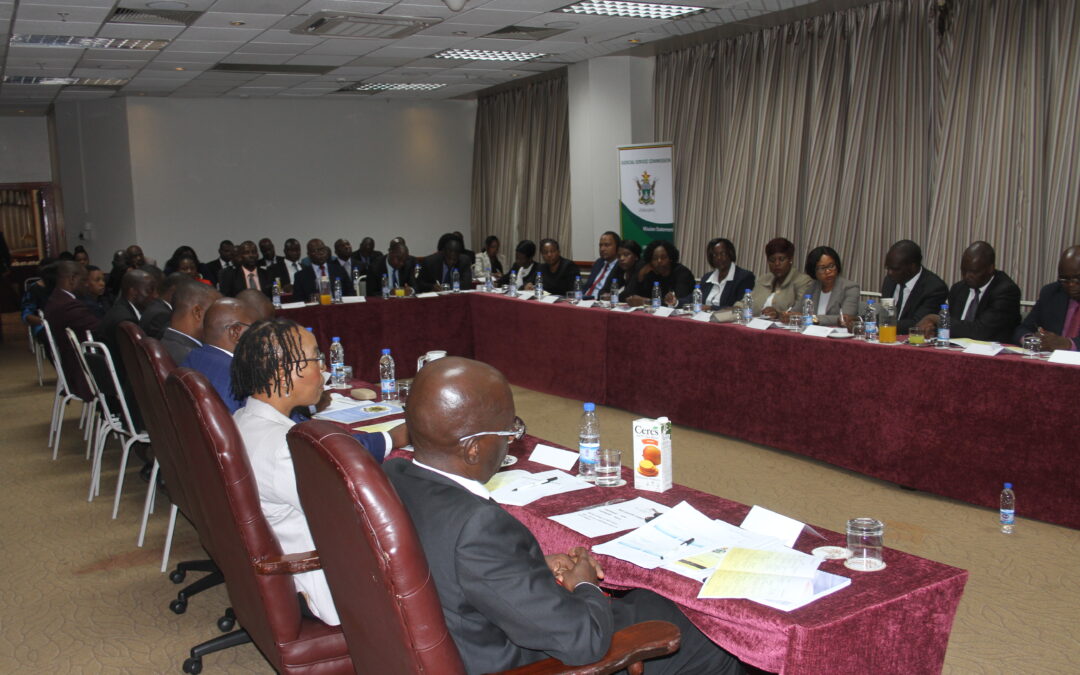
Nov 17, 2018 | News
The Judicial Service Commission (JSC) of Zimbabwe with the support of the ICJ convened a two-day workshop from 16 to 17 November 2018 in Harare to train magistrates designated to the anti-corruption court. 56 Magistrates (39 males 17 females) attended the Workshop.
Speaking during the workshop the Honourable Chief Justice, Luke Malaba encouraged the magistrates to work diligently to “flash out” corrupt elements from society.
He lamented that the current court practice seems to merely launder accused persons through constant remands which eventually lead to failed cases resulting in impunity for corruption in the country.
He pointed out that corruption is a threat to the rule of law urging the judiciary to be conscientious in dealing with corruption cases.
The workshop is part of a broader justice sector intervention by the JSC with the support of the ICJ, through generous funding provided by the European Union (EU) targeting combating corruption in the legal system.
The two-day training meeting looked at equipping 56 magistrates with the skills and knowledge to adjudicate cases of white-collar crime.
The training covered international best practices in the setting up of such courts, substantive law on corruption and practical court administration issues.
Besides the quality of the investigations, the effectiveness of the anti-corruption courts will also depend on the integrity and competency of the officers appointed to preside over them.
This workshop is one of a number of initiatives that the JSC are effecting with the support of the ICJ and the EU to contribute to a reduction in the levels of corruption and strengthen the ability of the justice system to resolve corruption and resource diversion cases in Zimbabwe.
Contact
Brian Penduka on brian.penduka(a)icj.org or +263772274307
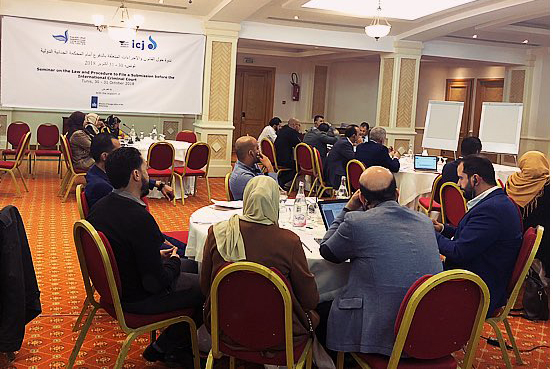
Oct 31, 2018 | News
On 28‒31 October 2018, the ICJ hosted two seminars for 30 judges and prosecutors and 26 lawyers from Libya.
The events were co-organized with the Libyan Network for Legal Aid and commenced with opening remarks by ICJ Commissioner, Justice Kalthoum Kennou of Tunisia.
The first seminar on 28‒29 October on “Fair Trial Guarantees in Libya in light of International Standards” aimed to deepen the understanding of Libyan judges and prosecutors of the application of international law and standards regarding fair trials.
The seminar covered pre-trial rights, such as the right to liberty, to effective legal counsel and to be brought promptly before a judge, and rights at trial, such as the right to defend oneself in person, to call and examine witnesses and to an appeal.
International fair trial standards were considered in light of Libyan domestic law and cases, including case 630/2012 involving 37 Ghaddafi-era officials.
The second seminar on 30‒31 October on “The Law and Procedure to File a Submission before the International Criminal Court” aimed to increase Libyan lawyers’ understanding of how to properly file a successful submission to the Office of the Prosecutor.
The Seminar covered the structure and functioning of the ICC, the jurisdictional and admissibility requirements, and the standards for collection and admissibility of evidence.
The Seminar further discussed the roles of NGOs, lawyers and victims in ICC proceedings, providing practical guidance on how and when to file a communication under Article 15 of the Rome Statute of the ICC.
Speakers included judges and prosecutors from international courts and tribunals as well as ICJ staff.









